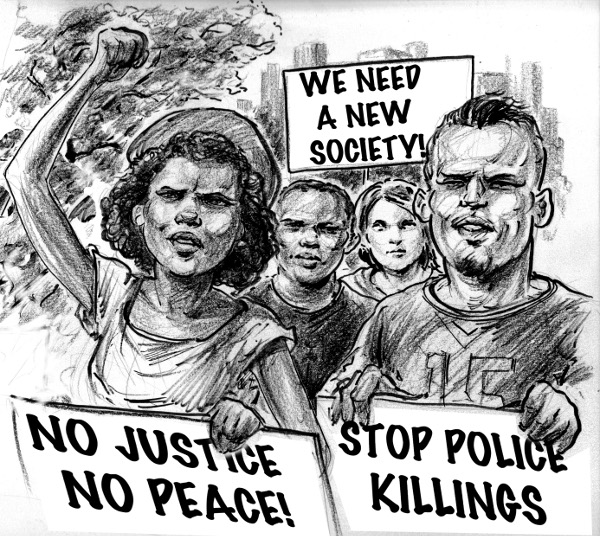
Unable to further disregard the growing mass reaction to police violence, spreading poverty and deepening social crisis, the ruling class has taken the tactical offensive.
The government is striving to take control of the growing movement to stop police violence. Their main weapon is to portray the problem as one of color (“racial”) discrimination—thus blocking the next stage in the revolutionary process. That next stage is the fight for the unity of a new class of low-wage, dispossessed, unemployed and destitute workers, created by the electronic revolution. Electronic production with little or no human labor is destroying this society—which is built on the wage-labor system.
An article by the Associated Press outlined the economic reality of America today. “Four out of 5 U.S. adults struggle with joblessness, near-poverty or reliance on welfare for at least parts of their lives, a sign of deteriorating economic security and an elusive American dream. Survey data exclusive to the Associated Press points to an increasingly globalized U.S. economy, the widening gap between rich and poor, and the loss of good-paying manufacturing jobs as reasons for the trend.”
The fight against police killing and for decent wages and job security cannot be won without a conscious fight to change the system. Human labor simply cannot compete with robotics. No matter what form the struggle takes, the content is increasingly class. In all the recent struggles against police murder and brutality, the people themselves have raised the question of class but too many of the “leaders” keep shouting color only.
We must spell out the relationship between class and color in this fight. As in any social struggle there is form and content. The form of the social struggle always arises from history. In America, that history is shaped by the 300 years of slavery based on color. Ultimately, the content of the struggle depends on the level of development of the means of production.
For example, with the mechanization of Southern agriculture in the 1940s and 50s, the economic need for the rulers’ use of the color factor began to wither away. There was no longer need for the brutality to keep Blacks in the field since machinery was more profitable than the near slave-like human labor that characterized the rural South. The color factor in ideological, political and social arenas would remain until it clashed with economic realities. Then, the complex, often bloody struggle to align social relations with economic reality begins.
At this point it is possible to introduce new ideas and new visions of a new world. The new, impoverished section of the working class cannot defend itself without destroying the rulers’ use of the color factor and replacing it with class. The effectiveness of the color factor as a weapon to keep workers divided is already being undermined by the integration of the Black upper strata into the American ruling class. Baltimore proves that changing the color of the oppressor does not solve the problem.
The Black masses cannot win their freedom without making class the leading factor. Class struggle will become inevitable if they do. In short, this is not a fight of the minorities, but prelude for political revolution.
Police violence aimed at poorest workers
Latest
The People’s Tribune opens its pages to voices of the movement for change. Our articles are written by individuals or organizations, along with our own reporting. Bylined articles reflect the views of the authors. Articles entitled “From the Editors” reflect the views of the editorial board. Please credit the source when sharing: peoplestribune.org. Please donate to help us keep bringing you voices of the movement for change. Click here. We’re all volunteer, no paid staff. The People’s Tribune is a 501C4 organization.


I believe the way we’re kept apart keeps us from achieving any parity with the 1%. Keeping the lower class whites separate from the blacks seems to be a time honored tactic of the ruling class. Blacks and whites together can whip their asses AND eat their lunch, they know it.